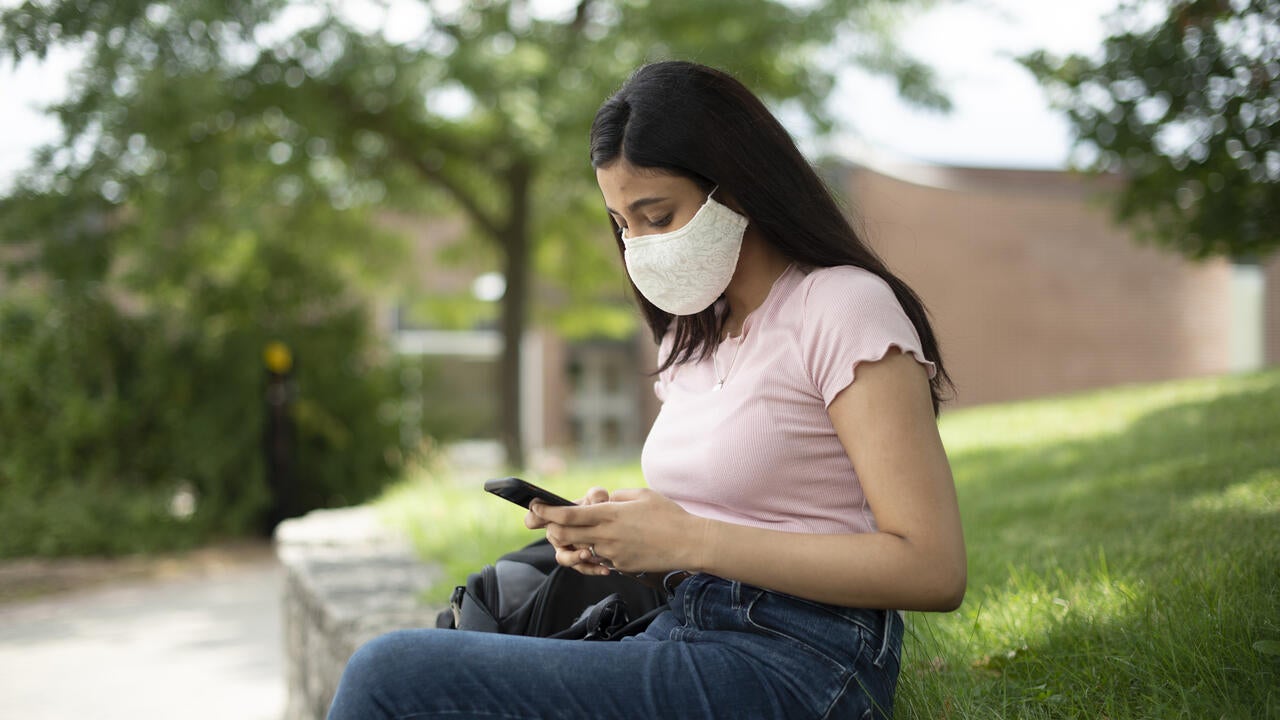
Protecting Canadians’ health without compromising their privacy
Waterloo researchers offer solutions to increase functionality of Canada's COVID Alert app

Waterloo researchers offer solutions to increase functionality of Canada's COVID Alert app
By Meghana Anthannagari University RelationsBeyond washing your hands and wearing a mask, experts say the formula for curbing the spread of COVID-19 is a combination of contact tracing, policy considerations and altering methods of data collection.
Leaders in mathematics, physical and social sciences, engineering, law and policy tapped into these issues at Waterloo’s Data and Privacy During a Global Pandemic Conference. Alongside Waterloo experts, speakers from Wilfrid Laurier University, University of Toronto, University of Ottawa, Microsoft and government agencies participated.
For the first time, Dr. Vivek Goel, president-designate for the University of Waterloo, joined the Waterloo talks. Dr. Goel is currently involved with helping Canada’s Public Health agency develop a Pan-Canadian Health Data strategy.
“The solutions to these challenges are not just going to come from technology, they have to include social, political dimensions, (shifting) attitudes and engagement with the population,” Dr. Goel highlighted.
Professor with the Department of Psychology, Igor Grossman, weighed-in on Canada’s notification app, which uses exposure data collection to curb the spread of COVID-19. COVID Alert claims to help break the cycle of infection, while letting others know of possible exposure before symptoms arise.
After analyzing the app’s popularity amongst residents, Grossman identifies the most dramatic differences between those who choose to install the app versus those who don’t is their trust in government.
To address these challenges, Grossman proposes, “providing any disclaimers related to the app, may actually increase trust in its functionality. We need to combat misinformation, re-establish trust and focus on transparency.”
So far nine provinces and territories are onboard with using the app and introduced it to its residents. More than five million Canadians have downloaded COVID Alert, however this number is relatively low compared to the nine provinces/territories’ overall population.
“We want to think about how we are going to deliver the message to Canadians more effectively, “suggested Professor Ashley Rose Mehlenbacher, specializing in rhetoric and science communication. “Thinking about what kind of communicators, other than Public Health officials, who can cater to particular audiences is important.”
A low download rate mitigates the usefulness of the app, impairing the ability of researchers to conduct relevant and significant public health research.
Professor of Economics and Director Master of Public Service, Anindya Sen, seeks to balance between the need for privacy and collecting data to contain the virus is needed.
“Policy-makers are working on knowledge gaps themselves, they might have misinterpreted preferences that Canadians value privacy over anything else. We now have less tolerant predictive models, limiting policy prescriptions- resulting in higher infections.
Many panelists proposed an added feature that allows users to check in on the number of COVID cases in their own neighborhood, while limiting their access to their region or city only. If a user tests positive, the app may be able to provide information on areas they visited over the last two weeks.
Users can choose to disclose this information to a case manager, for an enhanced contract tracing system.
Waterloo’s Data and Privacy During a Global Pandemic Conference was organized by the Master of Public Service Policy & Data Lab and GEDI and sponsored by the Waterloo Cybersecurity & Privacy Institute.

Read more
The Government of Canada announces funding to support research in food policies and medical devices

Read more
Researchers developed a process to reduce the amount of energy needed to run data centres

Read more
Here are the people and events behind some of this year’s most compelling Waterloo stories
The University of Waterloo acknowledges that much of our work takes place on the traditional territory of the Neutral, Anishinaabeg, and Haudenosaunee peoples. Our main campus is situated on the Haldimand Tract, the land granted to the Six Nations that includes six miles on each side of the Grand River. Our active work toward reconciliation takes place across our campuses through research, learning, teaching, and community building, and is co-ordinated within the Office of Indigenous Relations.